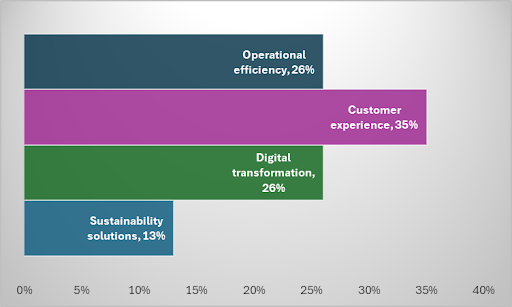February 6, 2025: As businesses navigate an increasingly
dynamic landscape, one truth becomes more and more clear:
“Innovation is the key to sustained success”.
Whether through enhancing customer experience, accelerating digital
transformation, improving operational efficiency, or embracing
sustainability, companies that prioritize innovation will shape
the
future.
improving operational efficiency, or embracing
sustainability, companies that prioritize innovation will shape
the
future.
A recent poll conducted by Quintes Global asked industry leaders about their primary focus for innovation investments in 2025.
The results provided valuable insights into how organizations are aligning their strategies:
- Customer Experience (35%)
- Digital Transformation (26%)
- Operational Efficiency (26%)
- Sustainability Solutions (13%)
Customer Experience: The Differentiator [36%]

In an era where customer loyalty is harder to earn, organizations are redefining customer experience (CX) through hyper-personalization and seamless digital interactions. AI-powered chatbots, predictive analytics, and real-time personalization are transforming how businesses engage with customers.
For instance, a global retailer leveraging AI-driven recommendations saw a 25% increase in conversion rates, demonstrating the impact of intelligent customer engagement. However, balancing automation with the human touch remains a challenge – over-reliance on AI may alienate customers who still value personalized human interactions.
INSIGHT:
“Organizations that successfully integrate AI, data-driven insights, and human-centric strategies will gain a competitive edge, driving brand loyalty and long-term revenue growth.”
Digital Transformation: Beyond Technology [26%]

Digital transformation is no longer optional – it is imperative for survival. While businesses are aggressively digitizing operations, a shift in the focus is urgently required – from merely adopting technology to driving meaningful outcomes.
Take the case of a Pharma GCC that transformed its finance and analytics function from a cost centre into a strategic advisory hub. By leveraging AI-driven insights and predictive analytics, the GCC provided real-time market intelligence, helping business leaders make data-backed investment decisions. The result? A 15% faster go-to-market timeline for new products and a 40% increase in data-driven decision-making across the enterprise.
INSIGHT:
“The challenge with digital transformation is not technology adoption – it is the cultural alignment, change management, and measurable impact. Organizations that fail to integrate digital initiatives with business objectives risk disjointed efforts that do not drive real value.”
Operational Efficiency: The Cost-Value Balance [26%]

Businesses striving for leaner, more agile operations are focusing on automation, process optimization, and AI-driven efficiencies. While operational efficiency has long been a focus, the shift now is towards efficiency that drives value beyond cost-cutting.
A leading media company, for example, successfully spun off its shared services into an innovation hub by adopting a differentiated outsourcing model. Instead of a traditional BPO approach, the partner became an extended arm of the company, maintaining exclusivity and proximity while leveraging external expertise. This resulted in agile tech-implementation, superior service delivery with a positive impact on EBITDA and cash flow.
INSIGHT:
“The best-performing organizations recognize that efficiency without innovation leads to stagnation. Instead of just optimizing existing workflows, they are rethinking processes, leveraging AI, and creating agile, scalable business models.”
Sustainability: The Emerging Priority [13%]

While sustainability solutions received the least votes in the poll (13%), the importance of sustainability in business strategy is growing. Governments and consumers alike are pushing organizations to integrate ESG (Environmental, Social, and Governance) factors into their core operations.
Companies investing in sustainability are seeing tangible benefits – from improved brand reputation to cost savings through energy-efficient operations. However, the biggest challenge remains high implementation costs and the complexity of redesigning supply chains.
INSIGHT:
“Despite these hurdles, sustainability is moving from a compliance requirement to a competitive advantage. Organizations that proactively adopt green initiatives, invest in circular economies, and integrate sustainability into innovation strategies will future proof their businesses.”
What the Poll Results Reveal About Industry Priorities
The strong focus on customer experience (35%) signals that businesses recognize the direct correlation between customer satisfaction and revenue growth. However, the equal emphasis on digital transformation and operational efficiency (26%) suggests that organizations are striving to balance innovation with cost-effectiveness.
The lower emphasis on sustainability (13%) may indicate that while ESG is important, businesses are still struggling to quantify its impact on profitability and growth. This suggests an opportunity for companies to rethink their innovation strategies to include long-term sustainability goals.
India’s 2025 Budget: Implications for Innovation Investment
#Budget2025 introduces several initiatives that could accelerate innovation investments:
- INR 20,000 crore for private-sector-driven R&D and innovation initiatives
- Deep Tech Fund of Funds to support cutting-edge startups
- Expansion of PM Research Fellowship to support technology research
- Tax reforms aimed at increasing disposable incomes, potentially boosting customer-centric industries
These measures indicate a strong push towards fostering innovation, digital transformation, and sustainable business growth. Organizations that align their strategies with these trends will be well-positioned to leverage incentives and drive long-term impact.
Final Thoughts: Innovators Will Define the Future
As we move into 2025, innovation is a necessity for competitive advantage. Organizations that invest in customer experience, digital transformation, operational efficiency, and sustainability will not only drive profitability but also future-proof their businesses.
With government support, evolving market dynamics, and the increasing role of AI and automation, the time is now for enterprises to rethink their innovation playbook. The future belongs to those who innovate – not just for short-term gains but for long-term, industry-defining impact.
What’s your take on this? Share your views.
